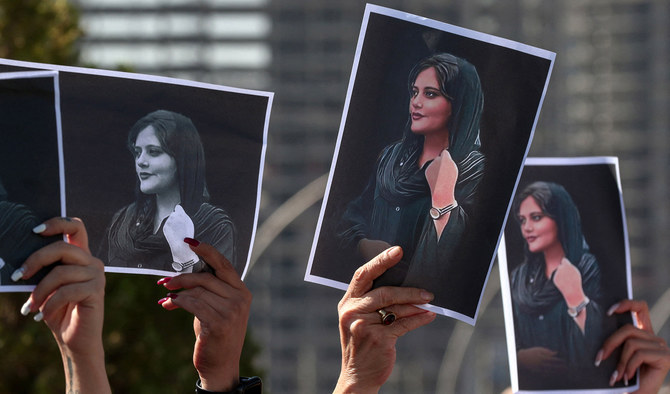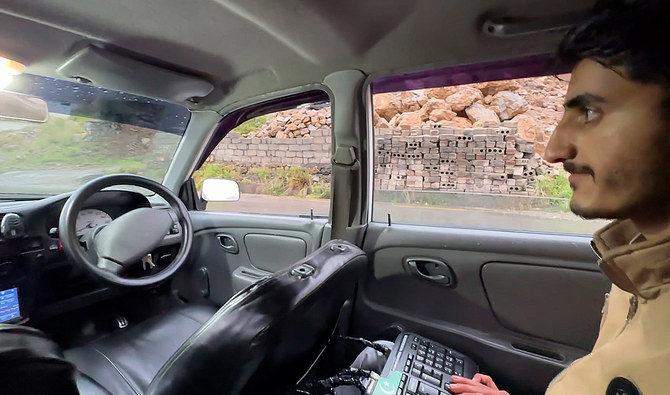KARACHI: Pakistan’s prominent women politicians and rights activists on Saturday condemned the death of Iranian woman Mahsa Amini, who died after being detained by Iran’s so-called morality police for disobeying the country’s strict dress code.
Widespread protests across Iran have resulted in 35 people getting killed over the past week, according to Iranian state media, as enraged citizens allege Amini, 22, died due to police brutality.
Amini was arrested in Tehran on September 13 for not wearing a headscarf by Iran’s morality police. She shortly collapsed at a detention center and was admitted to a coma.
On September 16, Amini passed away, triggering widespread protests and acts of defiance against the Iranian state. In several clips that have now gone viral on social media, women can be seen cutting their hair publicly and burning headscarves, an open challenge to Iranian authorities.
In Iran, women are required to follow a strict dress code which includes wearing a headscarf over their heads and putting on long, loose-fitting clothes to disguise their figures. The laws are based on Iran’s interpretation of Islamic law.
Protestors are demanding an end to what they say is police brutality, moral policing and are calling for women to determine their right to choose to dress as they please. The Gasht-e Ershad (Guidance Patrols) is a special police unit in Iran tasked with enforcing the laws on Islamic dress code in public.
Pakistani women politicians reacted to the incident, demanding more freedom for women in Iran and calling for an impartial investigation into Amini’s death.
“It’s really sad and if what is being reported is true, it's a shocking and blatant violation of fundamental rights,” Shazia Marri, Pakistan’s federal minister for poverty alleviation, told Arab News on Saturday.
Iranian police said Amini passed away due to a heart attack. It denied reports officers beat her head with a baton and banged Amini’s head against one of their vehicles.
“It’s a complete travesty of justice and highly condemnable. Everyone must have a right to choose,” Marri added.
Sharmila Sahibah Faruqui, a lawmaker of Pakistan’s provincial Sindh Assembly, said state brutality cannot be normalized in any country.
“It is heartbreaking to see how Mahsa Amini was brutally killed by law enforcement authorities for not wearing a hijab,” she said, speaking to Arab News.
“The voices of women must not be oppressed by the state. Women, who have been trying to break the glass ceiling, must be empowered, not silenced by state authorities,” Faruqui added.
Sehar Kamran, a former Pakistani senator, told Arab News that Islam ensures and protects the rights of women by guaranteeing their dignity and honour.
“Iran must ensure that a few individuals do not smear the name of law and Islam, and should bring the culprits to justice,” Kamran said. “The onus lies upon the Iranian authorities to ensure justice so that such events do not occur in the future,” she added.
Anis Haroon, a member of the Women's Action Forum (WAF) in Pakistan, told Arab News on Friday women’s rights have suffered in Iran due to compulsory dress codes, segregation and torture by the morality police.
“The role of the morality police should end,” she said. “The state has no right to [intervene] into the private lives of people. Women of Iran should be allowed to live like free human beings under the rights granted by the Universal Declaration of Human Rights (UDHR),” Haroon added.
Prominent lawyer Nighat Dad, who also runs the Digital Rights Foundation—a think tank tackling digital rights through a gender lens—wondered who defines what morality is.
“The way it [Amini’s death] has sparked resistance, the [Iranian] regime won’t be able to stop now,” she told Arab News on Friday, adding that men supporting these protests is a “testament to what the people of Iran basically want from the regime now.”
She said women were now deciding for themselves whether they wanted to wear the hijab or not. “And it is actually their own choice. When we say ‘my body, my choice’ in Pakistan, that is exactly what we mean. That we should have control over our body, not other people controlling it,” she added.
Prominent dancer and activist, Sheema Kermani accused Iran’s morality police of committing grave human rights violations for decades.
Kermani pointed out that the Iranian state was introducing restrictions on the internet and issuing warnings to citizens. “This is an ominous sign as it reflects the intention of the totalitarian regime to use more brutal force against the protestors,” she told Arab News on Friday.
“We are proud of Iranian women for offering strong resistance despite being the most vulnerable group,” she said.
Nayab Gohar Jan, an activist of the Pakistan Peoples Party, said it is time for Iran to have serious conversations about women’s rights. “Given the scale of protests across the country, it may also be time for Iranian authorities to open up dialogue on these issues,” Jan told Arab News.


















